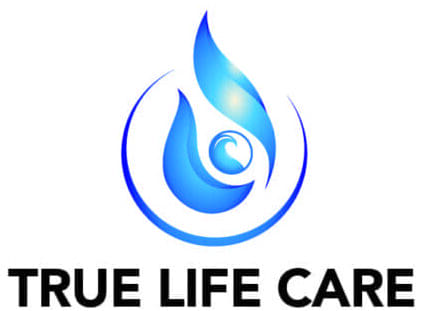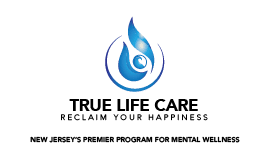How a Dual Diagnosis Treatment Program Can Help You Heal
Please contact our admission office for more informations about our dual diagnosis treatment program in New Jersey and how it can help you get holistic healing from symptoms of co-occurring disorders.

What Is a Dual Diagnosis Treatment Program?
A dual diagnosis treatment program is a specialized treatment program. It addresses the needs of individuals who have both a substance use disorder and a mental health disorder.
What is Dual Diagnosis?
Additional Terms for Dual Diagnosis
Dual diagnosis is also commonly known as co-occurring disorders” or comorbidity. The term “dual diagnosis” emphasizes the presence of two separate and significant disorders, rather than just a single issue.
What is the Connection Between Substance Use Disorder and Mental Health Challenges?
What Does a Dual Diagnosis Treatment Program Entail?
Dual diagnosis treatment programs involve a combination of therapies and interventions. These treatments address both the substance use and mental health disorders, and should be tailored to the individual’s unique needs, experiences, and circumstances.
Some of the therapies may include:
- Individual therapy
- Group therapy
- Support groups
- 12-step programs
Goal of a Dual Diagnosis Treatment Program
The goal of dual diagnosis treatment is to help individuals achieve and maintain long-term recovery. Recovery requires a comprehensive approach that addresses both conditions at the same time.
This includes an approach that takes into account the unique needs and challenges of each individual in order to holistically treat their symptoms.
How Does a Dual Diagnosis Treatment Program Differ From Other Types of Addiction Treatment Programs?
Dual diagnosis treatment programs differ from other types of addiction treatment programs in several key ways, including how they:
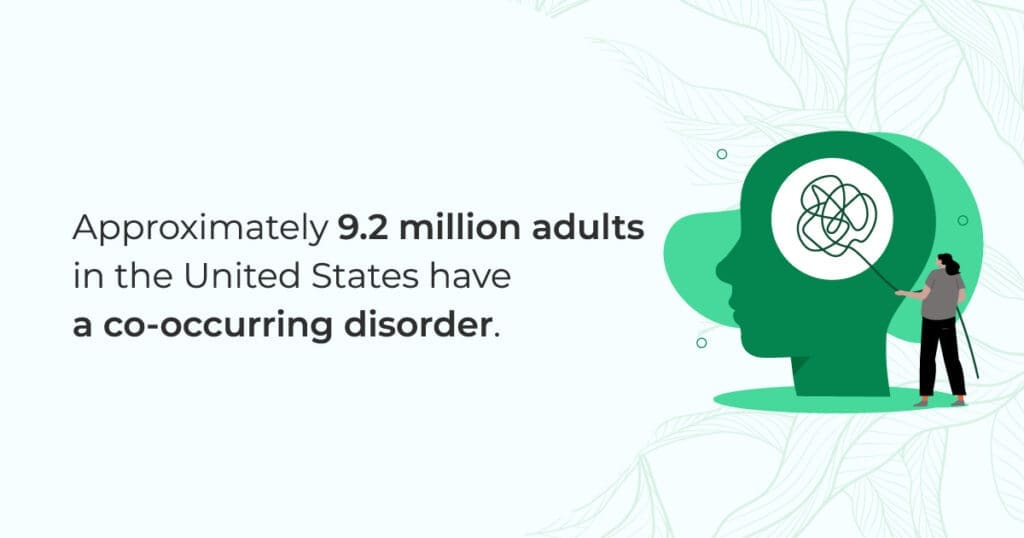
Address Co-Occurring Disorders
Integrate Mental Health Services
Dual diagnosis treatment programs integrate mental health services into the addiction treatment process. This may involve the use of medications, therapy, or other interventions. Each option addresses the individual’s mental health needs alongside their substance use disorder.3
Implement Treatment Length
Dual diagnosis treatment programs may need a longer treatment duration. Compared to other types of addiction treatment programs, it can last longer.
This is because the individual’s mental health needs may need to be addressed over a longer period of time. Co-occurring disorders can be complex, as their treatment requires addressing both conditions.
Utilize Specialized Staff
Dual diagnosis treatment is a specialized area of addiction treatment that requires a highly trained and experienced clinical team. Individuals with co-occurring substance use and mental health disorders require integrated and coordinated care that addresses both disorders simultaneously.
Because of this, dual diagnosis treatment programs often have specialized staff. The treating team may include professionals such as psychiatrists and psychologists. These professionals are trained to address both disorders at the same time.
It is important to research and choose a dual diagnosis treatment program that has a highly trained and experienced team. This helps to ensure that individuals receive the specialized care that they need.
Focus on Relapse Prevention
Dual diagnosis treatment programs place a strong emphasis on relapse prevention. Individuals with co-occurring disorders may be at higher risk of relapse.
So, many programs often involve the use of aftercare programs, support groups, and other resources. These focus on helping individuals maintain their recovery over the long term.
Dual diagnosis treatment programs are a more comprehensive and specialized approach. This includes addiction treatment that considers the unique needs of individuals with co-occurring disorders.
What Types of Mental Health Conditions Can a Dual Diagnosis Treatment Program Treat?
There are a wide range of mental health conditions that may be treated in a dual diagnosis treatment program.
Some of the most common mental disorders seen in individuals with co-occurring substance use disorders include:4
Depression
Depression is a mood disorder that can have a significant impact on an individual’s daily life. It is characterized by:
- Persistent feelings of sadness
- Hopelessness
- Loss of interest in activities that were once enjoyable
Depression can be caused by a variety of factors, including genetics, environmental factors, and life events.
Often, individuals with depression look to substances for relief. One out of three individuals struggling with major depressive disorder are estimated to also have a substance use disorder (SUD) as a means of self-medication.
Depression and Alcohol Use Disorder (AUD): A Common Dual Diagnosis
Substance Misuse and Depression Treatment Opportunities
Treatment may focus on addressing the underlying causes of depression. It also focuses on developing coping skills to manage depressive symptoms without the use of drugs or alcohol.
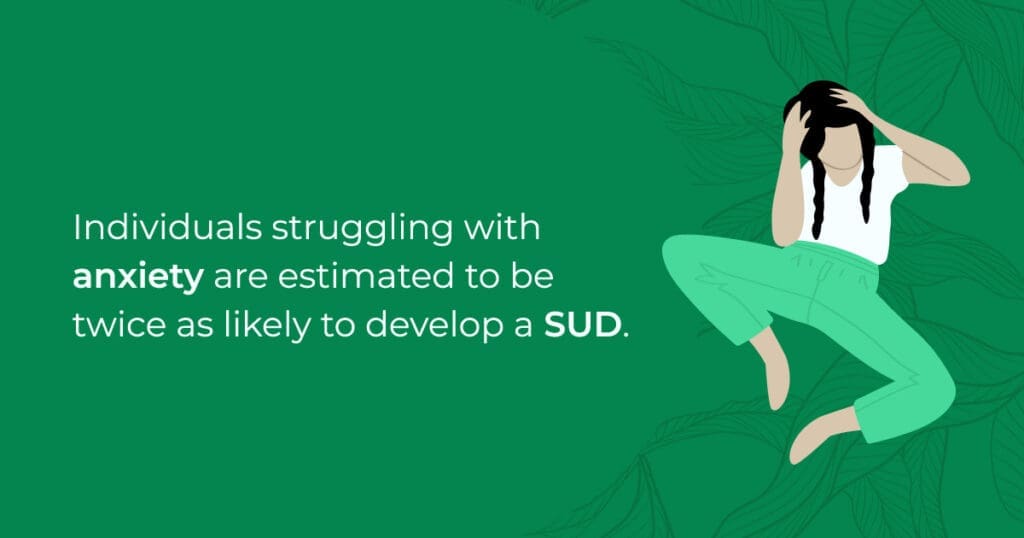
Anxiety
Anxiety disorders are a group of mental health conditions that can cause excessive worry, fear, and nervousness. Common types of anxiety disorders include:
- Generalized anxiety disorder
- Panic disorder
- Social anxiety disorder
- Specific phobias
Anxiety, too, is a risk factor for substance misuse. Individuals with anxiety are estimated to be twice as likely to also suffer from SUD.
Bipolar Disorder
Bipolar disorder (BPD) is a mental health condition characterized by extreme shifts in mood.
These shifts can occur in cycles of highs (mania or hypomania) and lows (depression). Bipolar disorder can have a significant impact on an individual’s ability to function in their daily life. This can lead to problems in relationships, work, and school.
This can also lead to individuals developing SUD as an unhealthy coping mechanism to alleviate the emotional challenges related to unmanaged BPD.
Bipolar Disorder and Substance Misuse Treatment Opportunities
Dual diagnosis treatment may include a combination of treatments to help with bipolar disorder. Treatment may focus on developing strategies to manage mood symptoms. It also focuses on skills to prevent relapse of both bipolar disorder and substance use.
Post-Traumatic Stress Disorder (PTSD)
Post-traumatic stress disorder (PTSD) is a mental health condition. It can occur in individuals who have experienced or seen a traumatic event. PTSD can cause a range of symptoms, including:
- Flashbacks
- Nightmares
- Avoidance behaviors
- Hypervigilance
These symptoms can have a significant impact on an individual’s ability to function in their daily life, and may lead individuals to develop a substance use disorder as a means to cope.
PTSD and Substance Misuse
In individuals with co-occurring substance use disorders, PTSD is a common co-occurring disorder. Substance use can often be a coping mechanism for individuals with PTSD.
A dual diagnosis program for PTSD may include therapy and behavioral interventions. Treatment may focus on developing coping strategies to manage PTSD symptoms without the use of drugs or alcohol.
It will also focus on addressing any underlying trauma that may be contributing to the development of both conditions.
Schizophrenia
Schizophrenia is a mental health condition that can cause a range of symptoms. The most notable of these are hallucinations, delusions, disordered thinking, and abnormal behaviors.
Like above, dual diagnosis programs for schizophrenia may use many treatments. Treatment may focus on:
- Managing symptoms of schizophrenia
- Developing coping skills to manage substance use
- Addressing any underlying causes
Schizophrenia and Substance Use Disorder
Several factors contribute to the co-occurrence of schizophrenia and substance use disorder:
- Self-medication: Some individuals with schizophrenia may turn to substance abuse as a way to self-medicate and alleviate distressing symptoms. Drugs or alcohol may temporarily relieve anxiety, depression, or social withdrawal associated with schizophrenia.
- Increased vulnerability: People with schizophrenia may be more susceptible to developing substance use disorder due to factors such as impulsivity, poor judgment, impaired decision-making, or social isolation.
- Shared risk factors: Schizophrenia and substance use disorder may share certain risk factors, such as genetic predisposition, environmental influences, or underlying neurochemical imbalances.
- Medication interactions: Substance abuse can interfere with the effectiveness of medications prescribed for schizophrenia, leading to treatment non-compliance or reduced symptom control.
Dual diagnosis treatment programs can help individuals to alleviate not only the symptoms of their challenges, but the underlying issues below the surface.
What Are the Benefits of Enrolling in a Dual Diagnosis Treatment Program?
Enrolling in a dual diagnosis program can provide many benefits for those struggling with co-occurring disorders.
Integrated Care
Dual diagnosis programs provide integrated treatment. This treatment addresses both the mental health condition and the substance use disorder. This can help individuals achieve better outcomes than if they were to receive separate treatment for each condition.
Dual diagnosis programs provide comprehensive care that addresses all aspects of an individual’s health. As a result, it goes beyond physical health to also include mental and emotional health.
Personalized Treatment
Treatment plans are tailored to each individual’s unique needs. This fact ensures that individuals receive the specific care they need. This can help individuals achieve wellness and improve their quality of life.
How Does this Compare to a Standard Addiction Treatment Program?
A standard addiction treatment program focuses on treating substance use disorders. In these programs, there can be little to no focus on underlying mental health conditions.
A standard addiction treatment program provides a more standardized, uniformed approach to treatment. This can be beneficial for some. For those with co-occurring disorders, though, it may not be as effective.
In all, a dual diagnosis program provides a more individualized approach to treatment. This can lead to better outcomes for individuals with co-occurring disorders.
Cons of a Dual Diagnosis Treatment Program
Dual diagnosis programs can be highly effective in treating individuals with both a substance use disorder and a co-occurring mental health disorder. However, there are some potential drawbacks to consider, including:
Limited Availability
Dual diagnosis treatment programs may be less common and less widely available than traditional substance use disorder treatment programs. This can make it more difficult to find a program that meets your specific needs and preferences.
Cost
Dual diagnosis treatment can be more expensive than traditional substance use disorder treatment, due to the need for specialized care and longer treatment duration. This can be a barrier for some individuals who are unable to afford the cost of treatment.
Stigma
There is still a stigma associated with mental health disorders, which can make it difficult for individuals to seek treatment for either or both of their substance use disorder and mental health disorders. This can be a barrier to accessing dual diagnosis treatment and receiving the care they need.
It’s important to weigh the pros and cons of any treatment program before making a decision. While a dual diagnosis treatment program can be challenging, it can also be highly effective in treating co-occurring disorders and improving overall quality of life.
What Types of Therapies and Interventions Are Used in a Dual Diagnosis Treatment Program?
A dual diagnosis treatment program utilizes a variety of evidence-based therapies and interventions. Some of the most common therapies and interventions used in a dual diagnosis program include:5
- Dialectical behavior therapy (DBT)
- Group therapy
- Individual therapy
- Medication management
- Family therapy
- Peer support groups
In all, a dual diagnosis program uses a holistic approach to treatment that addresses both the mental health condition and substance use disorder, providing a comprehensive and individualized approach to care.6
A Closer Look at Cognitive Behavioral Therapy (CBT)
How Long Does a Dual Diagnosis Program Last?
The duration of a dual diagnosis program can vary depending on a number of factors, including the severity of the individual’s substance use and mental health disorders, the specific treatment approach being used, and the individual’s response to treatment.
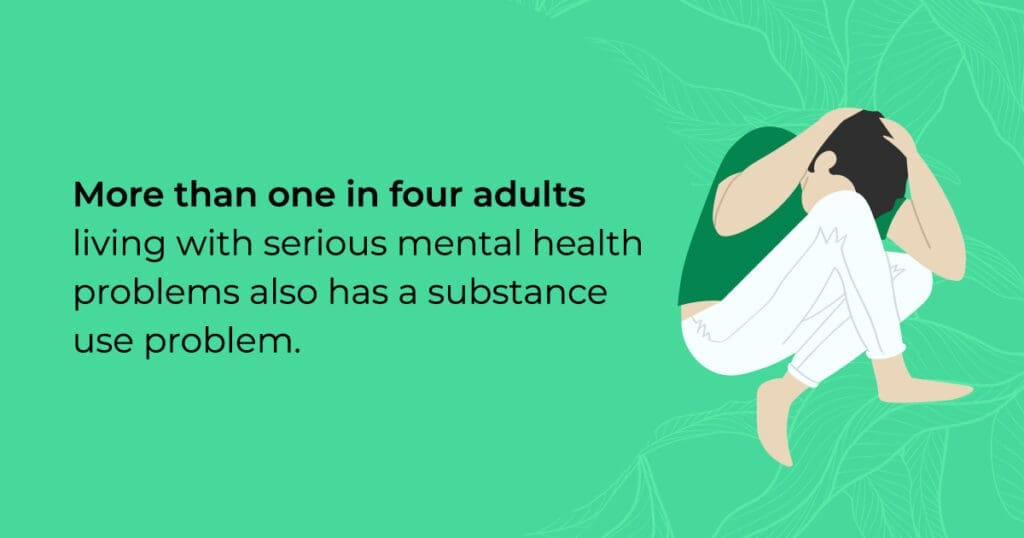
Dual Diagnosis vs. Traditional Substance Use Treatment Programs: Length of Treatment
In general, a dual diagnosis treatment program tends to be longer than traditional substance use treatment programs, as they require a more comprehensive and integrated approach to care.
Some programs may last as little as 30 days, while others may last several months or longer. The length of treatment will also depend on the individual’s progress and goals.
Some individuals may require a longer period of treatment to fully address both their substance use and mental health disorders, while others may be able to complete treatment in a shorter period of time.
Criteria to Enroll In a Dual Diagnosis Treatment Program
The criteria to enroll in a dual diagnosis program may vary depending on the specific program, but some general considerations to take note of include:
- Co-occurring mental health conditions and substance use disorder
- Willingness to take part
- Age
- Ability to adhere to program rules and expectations
- Funding or insurance coverage
It’s important to note that each dual diagnosis program may have extra or specific requirements for enrollment, and it’s best to contact the program for more information.
Individuals should also speak with a mental health professional or addiction specialist to determine if a dual diagnosis program is the best fit for their needs.
How to Choose the Right Dual Diagnosis Treatment Program For You
When choosing a dual diagnosis treatment program, it’s essential to consider factors such as the program’s specialization, treatment approach, and staff qualifications.
Look for a program that specializes in treating co-occurring disorders. This program should also be licensed and accredited. Not every facility is fit to offer this level of specialized care. As a result, research is essential to choosing the right program.
Additional Considerations
You should also consider the treatment approach. Each part of a dual diagnosis treatment program is tailored to the patient. There are some general shared factors, though. For instance, some programs may focus more on holistic care, while others don’t. Learning what approach is best for you can help you find the right program.
It’s also important to check the qualifications of the program’s staff. Different individuals will have different qualifications. Because of this, some professionals are better at treating different disorders than others.
By considering these factors, you can choose a dual diagnosis treatment program that provides the care and support you need.

Enroll In a Dual Diagnosis Treatment Program With True Life Care Mental Health
True Life Care Mental Health offers a specialized dual diagnosis program for individuals. Our program is designed to provide evidence-based therapy and support, and our goal is to help our patients achieve lasting recovery.
Our experienced and passionate clinical team understands the unique challenges that individuals with co-occurring disorders face. We are equipped to provide the specialized care that is needed to address both disorders effectively.
Our approach to treatment is personalized and comprehensive. We use a variety of evidence-based therapies to help individuals address underlying issues.
Get In Touch With Us Today
At True Life Care Mental Health, we believe that effective treatment requires a safe and supportive environment. Our program is designed to provide a warm and welcoming atmosphere where individuals can feel comfortable discussing their thoughts, feelings, and experiences openly and honestly.
We also involve family members and loved ones in the treatment process whenever possible, as we recognize the important role that they play in the recovery journey.
We are the Place For Anyone in the Recovery Community
If you or a loved one is struggling with both a substance use disorder and a mental health disorder, contact us today to learn more about our dual diagnosis program in New Jersey and take the first step toward lasting recovery. We are the place for anyone in the recovery community.
Resources
- https://pubmed.ncbi.nlm.nih.gov/22514848/
- https://www.sciencedirect.com/science/article/pii/S0740547207000979
- https://www.annualreviews.org/doi/abs/10.1146/annurev.psych.60.110707.163456
- https://www.sciencedirect.com/science/article/pii/S0740547206001437
- https://ps.psychiatryonline.org/doi/full/10.1176/appi.ps.51.9.1126
- https://www.tandfonline.com/doi/abs/10.1080/10550490500419060
